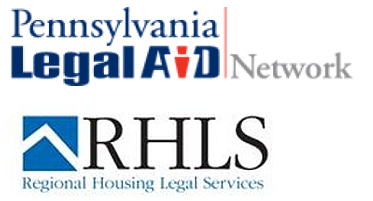Expanded and Universal Access to Legal Counsel Would Prevent Eviction and Benefit Communities
 A new report reveals the cost and impact of providing expanded and universal access to counsel for low-income tenants in eviction proceedings in Pennsylvania. The Pennsylvania Legal Aid Network (PLAN) and Regional Housing Legal Services (RHLS) commissioned the study, which was prepared by Stout Risius Ross, LLC (Stout), a nationally recognized advisory firm.
A new report reveals the cost and impact of providing expanded and universal access to counsel for low-income tenants in eviction proceedings in Pennsylvania. The Pennsylvania Legal Aid Network (PLAN) and Regional Housing Legal Services (RHLS) commissioned the study, which was prepared by Stout Risius Ross, LLC (Stout), a nationally recognized advisory firm.
The Stout Report provides an analysis of the benefits of universal access to eviction counsel in Pennsylvania as well as the costs associated with ensuring universal access to eviction counsel for eligible tenants. While PLAN’s member programs already provide legal representation to thousands of low-income households facing eviction each year, this study looked at the impact of universal access to representation for all low-income tenants facing eviction.
According to the study, providing expanded, universal access to eviction counsel would likely result in significant benefits that outweigh the costs of providing such representation; one estimate suggests that universal access to counsel would provide legal support for 17,200 additional tenant families faced with losing their homes each year. Families and communities benefit from the increased stability, especially youth whose health, education, and potential future earnings can be adversely impacted by eviction.
Furthermore, keeping people in their homes improves community health. Eviction moratoriums during the COVID-19 pandemic likely helped to reduce the spread of the disease, according to a study led by researchers in the Perelman School of Medicine at the University of Pennsylvania, Johns Hopkins University, and the University of Illinois at Urbana-Champaign. In addition, the availability of eviction counsel improves public health by reducing the negative physiological and psychological effects of eviction proceedings.
“Universal access to counsel in Pennsylvania would act as a game changer for thousands of individuals and families facing the loss of their home, and it would be a critical tool to address racial and gender inequities in eviction filings and removals,” says Dina Schlossberg, Esq., Incoming Executive Director of RHLS.
The Stout Report comes as a federal eviction moratorium is set to expire at the end of the month. Due to the moratorium, thousands of Pennsylvanians have been allowed to remain in their homes despite falling behind on rental payments. Although eviction prevention funding is available to assist some of these households, many will most likely require legal assistance as eviction filings increase in the coming months.
Though the study does not measure the precise economic benefit derived from universal access to eviction counsel, Stout estimates that cost savings may result in $3-$6 for every dollar invested in legal representation for tenants in Pennsylvania. In cities that offer universal access to eviction counsel, the study found a decline in eviction filings. If fully implemented in Pennsylvania, the Stout Report predicts that eviction filings will decline by 5 percent each year in Pennsylvania. Further, in areas where universal access to eviction counsel has been implemented, there is evidence that housing courts and landlords have saved time and money in eviction proceedings.
Based on data from the Unified Judicial System of Pennsylvania, Stout estimates that there were approximately 84,470 eviction case filings in Pennsylvania in 2019. With the significant impact and disruption caused by the pandemic, it is difficult to predict how many eviction cases will be filed during the remainder of 2021 and into next year. This underscores the need for expanded access to legal counsel and the importance of increased funding for civil legal aid.
According to Patrick Cicero, Esq. PLAN’s Executive Director, “Each year the legal aid programs that we fund provide legal representation to thousands of households facing eviction. This work is essential to helping families preserve their homes through representation in court or through eviction diversion programs. It is clear from the Stout Report that additional funding is necessary so that all low-income households facing eviction anywhere in the state have access to counsel to help them through this process. No one should face eviction without the possibility of access to legal representation.”
Schlossberg adds, “With many eviction protections coming to an end, RHLS will continue to advocate for equitable solutions so that all individuals and families in Pennsylvania have access to stable housing.”
PLAN is a coordinated system of nonprofit organizations that provide free civil legal services to Pennsylvanians. The mission of the Pennsylvania Legal Aid Network is to ensure equal access to justice so that Pennsylvanians can have representation when facing important civil legal matters affecting their safety, health, shelter, and survival.
Regional Housing Legal Services is a nonprofit law firm with unique expertise in affordable, sustainable housing and its related components— community and economic development, utility matters, and preservation of homeownership. RHLS provides innovative project and policy solutions which help to create sustainable communities that offer decent, safe, and affordable housing to low-income Pennsylvanians.
View Report: The Estimated Cost of Universal Access to Eviction Counsel in Pennsylvania